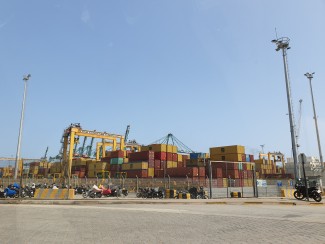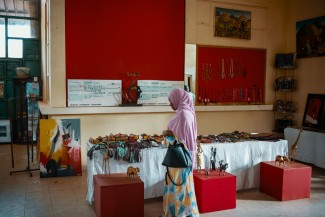Funding for traders, for government trade support and for infrastructure means resources at work in critical spaces in Rwanda
At the dozens of posts along Rwanda’s borders where people can cross into neighboring countries, there is a bustling and lucrative trade in goods. And, those trade networks extend alongside and beyond the crossing points, with people buying and selling where and when they can.
Recognizing that this commerce is vital for the country’s citizens and essential for economic development, Rwanda is addressing its cross border trade on the ground and at the policy level, and making progress.
“The Government is trying to encourage traders to do business in a formal way, to do it in accordance with government procedures and policies that are in place to help them do business efficiently,” said Patience Ingabire, Trade Specialist at the Rwanda Ministry of Trade and Industry.
“With the establishment of cross border markets, we will be able to provide different support to the traders when they are together in specific locations,” she added.
To facilitate this work, the country has established a dedicated body that is coordinating the effort, which spans its various partners like the Enhanced Integrated Framework (EIF), TradeMark East Africa (TMEA) and the World Bank, and various interventions from infrastructure and training to policy and management.
As a result, donor resources have been leveraged and targeted for optimal impact, private sector investments are on the rise and small-scale traders now have access to financing.
[image]
BETTER BUSINESS
“Rwanda’s cross border trade work involves multiple national and global partners, and we have seen a lot of success in leveraging resources, which translates into great gains for Rwanda’s people,” said EIF’s Simon Hess, who coordinates the programme’s work in the country.
“This also has positive effects on regional trade in the area, where there are major opportunities for impact,” he added.
Improving the trade environment at these interstices means that costs are reduced for individual traders, who are mostly women, and that there is now space for attention to the quality of the items being sold.
“Traders are crossing the border with low quality goods or with poor packaging. There is a real need to have them in the same place so as to help them with their business capacity in terms of value, in terms of quantity and to attract traders in neighboring countries to come and buy quality goods,” Ingabire said.
As part of this move to streamline trade at the borders and improve export values, markets where trade is centralized and secure are being constructed across the country by the African Development Bank, the World Bank, TMEA and EIF, among others.
[image]
RETURN ON INVESTMENT
TMEA has been addressing multiple facets of Rwanda’s cross border trade, from trader trainings to helping to create cooperatives to the market centres themselves.
They have provided support to 63 women’s cooperatives, of which 27 were formed as direct result of the project. This resulted in individual monthly trade volumes increasing from US$10 to US$40, while cooperative trade volumes increased from US$1,875 to US$4,000 per trip. And 25 cooperatives have accessed loans, grants and matching funds totalling US$250,000.
The cooperatives are a key element in support for Rwanda’s small-scale traders as they are facilitating information exchange and education, which also leads to profits.
“The challenge before was that traders were all trading in different commodities, and TMEA did research to see how they could consolidate and focus on one or two commodities that were more profitable rather than much smaller ones,” said TMEA’s Anataria Karimba, who works on their cross border trade efforts in Rwanda.
In 2015, informal cross border exports for Rwanda were estimated at US$108 million, and formalizing this commerce means better conditions and incomes for traders as well as better exports and infrastructure all around.
[image]
EXPANDING EXPORTS
“One of the most direct ways that we’ve seen a poverty reduction impact from TMEA’s work has been tackling the barriers to informal cross border trade, which directly targets low income traders. This has included improving infrastructure, like setting up one stop border posts that make it quicker, easier and safer for traders to move across borders, but also ensuring that the right infrastructure is developed on both sides of the border – not just on the Rwandan side,” said Anna Gibson, Private Sector Development Advisor in Rwanda for DFID, which is financing a range of trade support in the country including via EIF and TMEA.
“But it’s not only the physical barriers to cross border trade that need to be tackled, we are also doing work to support trade facilitation policy and helping to monitor and remove the non-tariff barriers that make it more costly to trade across borders, which is line with the government’s National Export Strategy,” she added.
As this work in Rwanda continues to coalesce and as structures both concrete and operational emerge, targeted investments from partner countries and from the private sector are playing a major role – with the same goal of improving the country’s cross border trade.
“With trade being stimulated as it is in Rwanda, we are seeing a range of investments coming in, for example towards infrastructure like roads and border posts, and industrial hubs. That is alongside the support for traders and cooperatives that directly improves incomes, but that also enhances the quality of Rwanda’s exports,” said Hess.
If you would like to reuse any material published here, please let us know by sending an email to EIF Communications: eifcommunications@wto.org.



